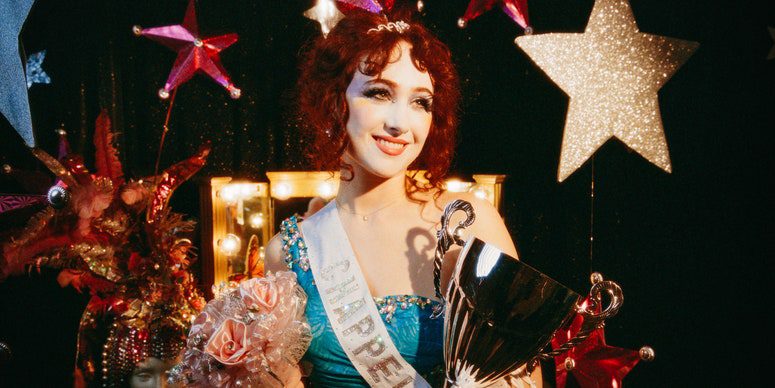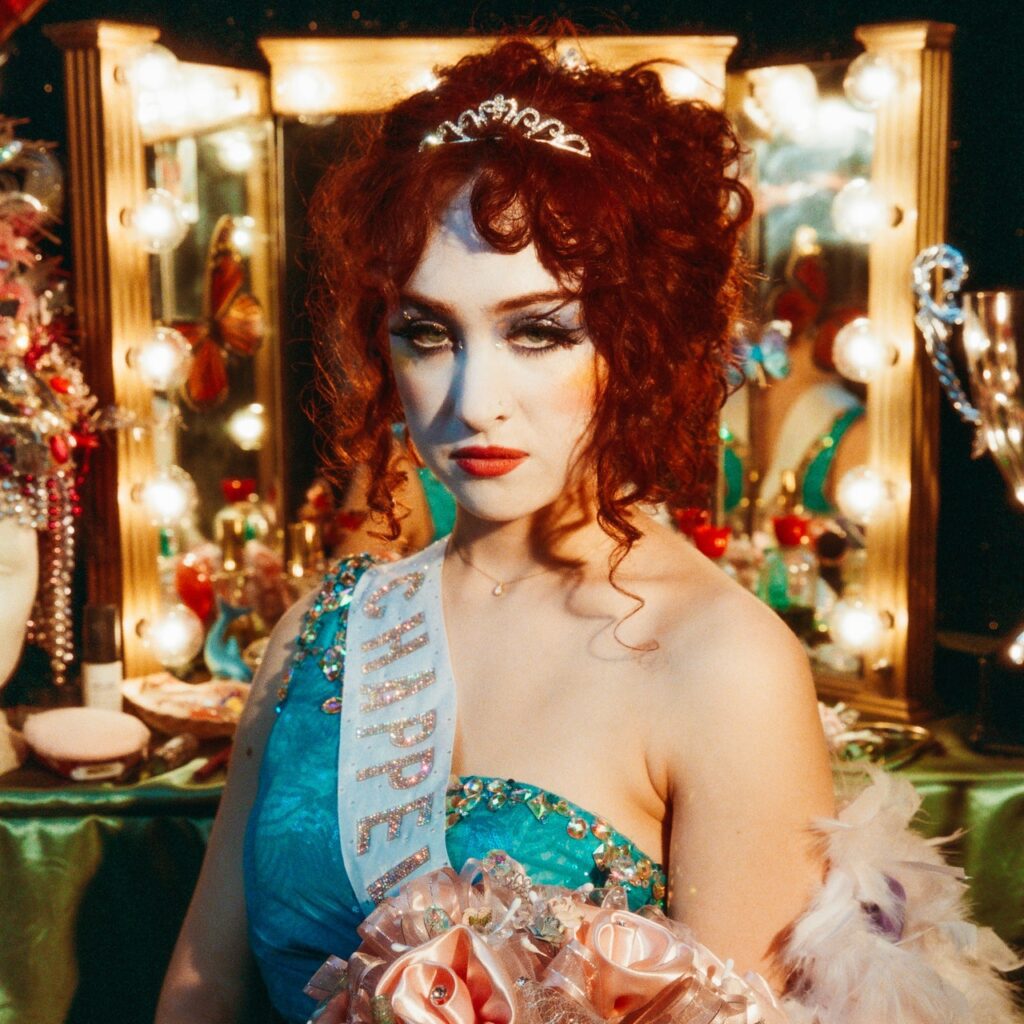You grow up in the Midwest; your dreams sprawl wider than the freeways; the big city starts to beckon. Chappell Roan, daughter of Willard, Missouri, secured her ticket out through YouTube, where as a teenager she uploaded the cover songs that got her a major label deal before she finished high school. She started spending time in L.A. and recorded a series of dour, downtempo pop tunes. But Willard still had her in its grasp: In a promotional video from 2017, released around the same time as her first EP, Roan gazes mistily out a plane window and admits, “When I go back to L.A., I just don’t feel as grounded as I do when I’m home.”
When her music lacked place and purpose, Roan found both at the Abbey. The storied West Hollywood gay bar inspired “Pink Pony Club,” a disco ball-dappled ode to escaping the suburbs for the California nightclubs. The song, released in 2020, effectively ended one chapter of Roan’s career: Her label, Atlantic, dropped her after its release. But it also pointed in a new direction. The “Pink Pony Club” is back open for business on The Rise and Fall of a Midwest Princess, Roan’s full-length debut, a bold and uproarious pop project stitched with stories about discovering love, sex, and oneself in a new place. Marking her debut for Island Records, it’s buoyed by youthful vim and steely indifference to the bounds of good taste.
Midwest Princess was written and produced with Dan Nigro, the onetime indie frontman who has recently gained prominence via his creative partnership with Olivia Rodrigo. As songwriters and performers, Rodrigo and Roan agree on a lot: Both are committedly theatrical and wickedly funny, even in the face of emotional indignity. “Casual,” Midwest Princess’s high point, lobs a cocktail of sorrow and scorn at a romantic partner who refuses to acknowledge the significance of their situationship. “Knee deep in the passenger seat and you’re eating me out/Is it casual now?” Roan deadpans in the chorus, cramming one of the record’s most vivid images into a single breath. The outro turns up the heat and raises the stakes: “I fucked you in the bathroom when we went to dinner/Your parents at the table, you wonder why I’m bitter?”
Roan is blessed with a powerful and versatile voice, heard in full force on the blowout final line of “Casual.” On the otherwise unremarkable “After Midnight,” she floats some lovely whistle tones; on “Picture You,” she channels Patsy Cline, her voice warm and full-bodied, her phrasing immaculate. But, also like Rodrigo, she can be persuasive with less precise or tuneful deliveries. In the half-spoken, half-yelped bridge of the yeehaw booty call “Red Wine Supernova,” her comedic potential is maximized (“I heard you like magic?/I’ve got a wand and a rabbit!”). She zips through the verses of “Hot To Go!” with all the urgency of a spark burning through a fuse, then calls in the pep squad to spell-sing the title.
Across the album, gang vocals have big cheerleader energy, tapping into an aesthetic that has been co-opted and queered in a cultural lineage running, within Roan’s lifetime, from the 1999 cult classic But I’m a Cheerleader all the way through Mia Berrin’s indie rock project Pom Pom Squad and this summer’s teen sex romp Bottoms. It’s not the only high school touchstone on Midwest Princess: In the wide-eyed, disco-pop awakening of “Naked in Manhattan,” Roan plays the eager ingenue, her fantasies pasted on a glittery moodboard that includes queer-coded slumber parties, hair pins, lip gloss, and Regina George, the teen antagonist of Mean Girls. In her visuals, Roan plays putt-putt and references the 2006 mermaid romcom Aquamarine; onstage, she has worn a blonde wig in tribute to Hannah Montana, the fictional pop star that Miley Cyrus portrayed on the Disney Channel between the ages of 13 and 18. Roan is 25, but this suite of references maps to a cultural moment that is, even more so than usual, fixated on youthful femininity. It also speaks to the experience of coming into your sexuality in your 20s—something akin to a second adolescence.
In its subject matter, but also in its target audience, Roan’s music is explicitly queer; she has attributed her artistic breakthrough to her decision to “stop trying to impress the music industry and start trying to impress gay people.” Roan—who touts her outsider credentials, calling herself “the pop star of Goodwill,” despite being signed to a major label—seems happy to skip a bid for the center and plant herself in the margins, where she leans into drag aesthetics and camp. “Super Graphic Ultra Modern Girl” opens with a main-character monologue, condemns “hyper-mega-bummer boys” for the high crime of wearing “fugly jeans,” and glibly references planetary collapse. It understands house music through the lens of Madonna’s “Ray of Light” and RuPaul’s “Supermodel.” It’s dumb, and electrifying. Zanier still is “Femininomenon,” a Frankenstein’s monster that splices stacked vocals à la Lorde, ad libs à la Kesha, a synth that sounds like a groan tube, and the inane lyric “Get it hot like Papa John!”—perhaps the pizza franchise’s biggest pop crossover moment since they plastered Taylor Swift’s face on their boxes.
As the album opener, “Femininomenon” feels like a test of listeners’ tolerance, designed to drive away those that can’t hang with the excess of it all. At the same time, such gags function as decoys, distracting from how sturdy and studied Roan’s songcraft actually can be. One of her oft-cited references is Katy Perry’s Teenage Dream, an album lab-engineered for catchiness and mass-market saturation, and for all her outré qualities, Roan has a clear connection to this pop lineage. She generally favors conventional song structures and builds to seismic choruses. Her writing is focused and concept-driven, often scaffolded around a single word or image. “Coffee” and “Kaleidescope” are lesser examples—not coincidentally, both are rather somber piano ballads—but “Picture You” is perfectly executed, conjuring drawn curtains and flickering candles in the bedroom where Roan fantasizes alone, “counting lipstick stains where you should be.”
If listening to “Picture You” feels voyeuristic, it’s not because of its intimacy or innuendo, but because of its implication of shame: “I’m too scared to say/Half of the things I do when I picture you,” Roan quivers. Slivers of doubt hang around the edges of Midwest Princess, adding dimension to its narrator and enhancing its sense of defiance: When Roan’s friends call her a loser, or she imagines her mom pearl-clutching over her behavior, their disapproval and doubt threatens to puncture her hard-earned exuberance. In closer “Guilty Pleasure,” Roan attempts to blunt their weapons, positing her guilt and pleasure as two sides of the same coin. “I want this like a cigarette/Can we drag it out and never quit?” she sings, relishing the freedom of making an unhealthy choice. Sneakily, she’s also suggesting a framework for interpreting her more over-the-top gambits: so bad they’re good, so dumb they’re smart.
All products featured on Pitchfork are independently selected by our editors. However, when you buy something through our retail links, we may earn an affiliate commission.


